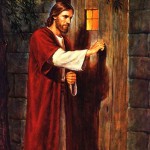 Now it came to pass, as He sat at the table with them, that He took bread, blessed and broke it, and gave it to them. Then their eyes were opened and they knew Him; and He vanished from their sight. (Luke 24:30-31)
Now it came to pass, as He sat at the table with them, that He took bread, blessed and broke it, and gave it to them. Then their eyes were opened and they knew Him; and He vanished from their sight. (Luke 24:30-31)
Let’s say that you invited me and Sulojana over to your house for dinner. YOU are the host. WE are the guests.
When we are seated at your dining table with you and others in your family, we would expect you to initiate the serving of the food. That would be proper etiquette. Right?
We would wait for you to either pass a dish around or say something like: “Pastor Jeeva, why don’t you help yourself to the casserole and pass it to your right?”
How would you respond if Sulojana and I started taking charge of the meal and said: “Ok, everybody, just help yourselves to whatever dish is closest to you and pass it to the person on your left?”
You may say nothing out of respect. You may be thinking: “Who do these people think they are, coming to my house at my invitation and acting as though they own this place?” Or you may want to scream: “Hey, who’s the guest here and who’s the host?”
The guest has become the host. And that would be a reversal of roles. A totally unexpected turn of events.
When Cleopas and his companion invite Jesus into their home in Emmaus, they think that they are doing this stranger a favour by offering him food and lodging for the night.
They are seated at the table. Now it is time for Cleopas and his companion (who could’ve been his wife, we are not told) to be good hosts. They were about to take the bread and offer it to their guest of honour, but Jesus beats them to it.
He takes the bread, gives thanks, breaks it and gives it to them. The guest has become the host.
I am sure you are very familiar with this verse from Revelation 3:20: “Behold, I stand at the door and knock. If anyone hears My voice and opens the door, I will come in to him and dine with him, and he with Me.”
The first thing we note about the context of this verse is that it is not addressed to those who have not made Jesus the Lord and Saviour of their lives. It is part of Jesus’ letter to the church in Laodicea as dictated to John on the island of Patmos.
The second thing is that the onus is on the one on the inside to open the door and let Him in. Now you know why paintings of this verse show no doorknob on the outside where Jesus is knocking. He can only be let in, he does not let Himself in.
The third thing is the promise He makes about dining with the one who lets Him in. If the incident in Emmaus is any indication, He is coming in, not to be your guest, but to take over as the host!
You will not be passing the bread to Him. He will be taking the initiative, breaking the bread and feeding you!
Inviting Jesus into your life means that you relinquish ownership. You need to let Him take over. It is only as He becomes the host that the disciples of Emmaus receive the revelation of who Jesus really is.
Dear DWOD friend, it is the same for you and me today. Jesus longs to have lifelong communion with you. He is standing at the door and knocking. Whether He comes in or not hinges on your willingness to open the door and let the guest become the host.
Follow Us